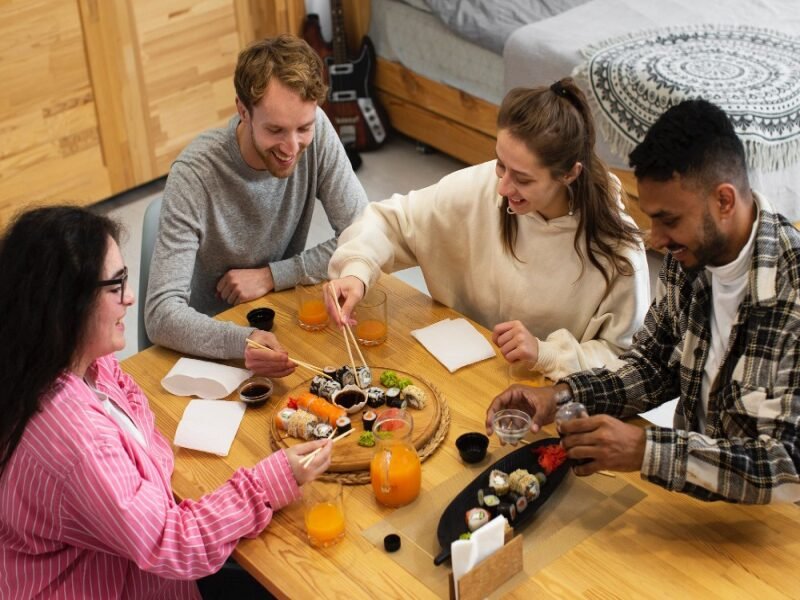Introduction – The Joy of Sharing Food
Chaotic and complex, the world is no longer a place of travel to view the sites, to take a picture. I always thought it was about travelling to different places, having different perceptions, and elite friendship. And what better way to accomplish that than by using the language which is food? A visit to a restaurant is a great way to get to know people and learn about their daily experiences and cultural attitudes that are still more than the experience of visiting is worth. Culinary tourism, or gastrotourism, is one of the increasingly popular subtypes of niche tourism where people focus on selecting the desired direction, paying the greatest attention to food. It’s about enjoying the dish and knowing the history of each one. It may be markets or family kitchens; the ability to join people in their meal brings an understanding of culture that is much deeper.

Why Share Food with Locals?
Deeper Cultural Understanding
Food is one way through which you can learn more about a culture and the people of that culture. He said it has got social cultural values, historical significance as well as geographical indications. That is why whenever you seat down and make a meal with the locals, you are not only eating their food, but also learning about their culture. Simple things like learning how to prepare a dish, learning about the importance of a certain ingredient being used or how one sits while eating the food encompasses learning a lot about a culture.
For instance, in Asian countries, people put part of their plate on a common table with other families due to communal dish. While serving individual portioning is much more typical for Western societies. That way, one gets to be more sensitive with the different cultural values that are embodied in most of the foods we consume.
Creating Interpersonal Relationships
What is important is that exchange of food promotes conversation and interaction. It is said that to eat is human, by sharing the same food, the locals will feel at ease to deal with you at, or even a better level. From sharing and enjoying soup on shallow baskets in Vietnam to having a hearty non-alcoholic daybreak meal together in Spain, people want to be friends, and this makes travelling get to be the best thing.
Let me introduce you to the concept of eating with a stranger, the feeling is rather liberating when you find out you share similar passion for tasty cuisine. It cuts across the various linguistically as well as culturally bound people, bringing together the aspect of unity in the whole of humanity.
Exploring Delicious hidden Dining Spots
People are always the best tour guides when it comes to food. They are aware of small and cheap cafes, the latest markets with food, and delicious local specialties that visitors have no time to find. If you get in touch with people of the country, you get to explore many more genuine food spots that you won’t find in the common tourist guide.
Think about getting invited to a family dinner in Italy where everyone is enjoying their great grandparent homemade pasta sauce. Or perhaps you sign up for a Thai food tour that takes you through night markets in local Thai cities and introduce you to fruits you have never seen before. These are the times that make a difference and actually develop a relationship with a place or area.

How to Connect with Locals Through Food
Finally now that we have looked at the ‘why’ it is time to look at the ‘how’. Here are some practical ways to connect with locals through culinary experiences:
Take a Food Tour
Tasting tours are such an incredible experience to taste all the regional delights. Most guided tours are conducted by experts in the field, and these take you to obscure parts of the region, which are considered the guide’s personal favorites. Not only you get to taste some mouth-watering Foods but you also get the background knowledge of why such foods are prepared and what they represent.
Today, most cities have developed several tour types in which food takes most of the attention, whether it is the sector of origin, types of foods or the era of the foods. Try to avoid large bus and boat tours and choose those that employ small-scale guides who will share first-hand experience.
Here are some reputable food tour companies and platforms:
- Eat With: As you will find, this platform allows tourists to find culinary hosts who can provide them with dishes of local cuisines, as well as teach them how to cook these dishes.
- Airbnb Experiences: Airbnb is home to several food-focused Experiences that provide travelers a guided tour of the cuisine much like a citizen.
- Urban Adventures: This restaurant business provides food tourism services in several cities together with paying attention to cultural off-the-beaten-path experiences and working on sustainable tourism.
- Viator: This platform provides various food tours and gastro activities in different countries, it is possible to set filters regarding price, group size, and preferences.
Attend Cooking Classes
To help me learn culinary identity it became most valuable, therefore, to learn to cook local dishes. Learning cookery requires practical action since you are able to touch the food and beside this, you can also be able to talk directly with the cooks. It’s not only that you will get to know new recipes and dishes, but you’ll also get to know why specific ingredients and methods are used in preparation of the specific dish.
Most of the cooking schools and culinary centers provide classes for tourist having lessons in basic culinary and specific dishes. Other general cooking classes may also available at families ‘homes or community centers which may be more personalized and engaging.
Here are some platforms and schools offering cooking classes:
- The International Kitchen: This company specializes in cooking weekends and food holidays where you get a chance to be in other countries and learn how to cook using the local foods.
- Cookly: This web-service offers visitors cooking classes all around the globe start Time The classes can be in different categories and for different levels of difficulty.
- Airbnb Experiences: Airbnb also also allows the customer to attend cooking classes where locals demonstrate recipes in a home kitchen.
Visit Local Markets
Local markets really are a sensory overload. These are usually lively, bustling areas in which you can buy meat , fish, vegetables and fruits, traditional food and drinks. Meeting vendors and using new components can be characterized as the best way to get to know the local fare directly.
You should not be shy to ask questions, to taste some products and to try yourself in the role of a negotiator. Markets are also not only perfect to watch the traditional way of life but also to communicate with the people.
Tips for visiting local markets
• Go early: Markets are generally overcrowded especially in the morning hence one should arrve early morning to have the best prices for their produce.
• Bring cash: There are a number of cases when a vendor will not accept a credit card and so you should have some money with you.
• Be respectful: Respect local cultural features such as greetings and demeanor while bargaining with the and other consumers on the marketplace.
• Try something new: If you haven’t tried the fruits, vegetables, or food sold by road side vendors, go ahead and try them.
Dine with Locals
That is why to eat together with a local family can be an unforgettable moment. Even though it can only tell a little about their daily live, it is real cultural encounter. These include information on their family culture, preferred dishes, and story.
There are multiple platforms and initiatives that will let travelers dine with the residents. Some of them offer additional information about the hosts, their foods of preferences and types on setting for the places.
Here are some platforms that connect travelers with locals for meals:
- Eat With: On this app, people can enjoy the authentic local dining such as casual dining, for dinner, or even dining with a specific theme.
- Bonaparte: This platform helps travelers meet home chefs to be able to taste traditional food in their homes.
- Meal Sharing: This platform is based on the idea of sharing the table with the people from the place one is visiting, the organized meals, or invited to share a meal with a local.
Tips for dining with locals:
- Be punctual: Get to the meal on time to show some courtesy to your host’s time of the day.
- Bring a small gift: A small token of appreciation such as a local magnet or a bottle of wine is the way to go.
- Engage in conversation: Talk with your host about his/her culture and/or experiences and express your personal opinion and experience.
- Be mindful of cultural differences: Follow certain etiquette during the meal such as which fork to use, or which topic to avoid during conversations.
Through the mentioned opportunities which involve engaging in food transactions with the locals you will not only be making unforgettable memories but also beginning to appreciate the cultures of the places you visit. Useful/advice on Meaningful Culinary Experiences
While the idea of sharing food with locals is exciting, there are a few things to keep in mind to ensure a respectful and enriching experience for everyone involved:
Be Open-Minded
That is why the most crucial point for a man, who would like to taste something new nation’s dish, is to keep an open mind. Stepping out and eating strange looking food is not such a bad idea as they might seem at first. There are hidden treasures here you might end up becoming a fan of the foods in this list.
These make concept comprehensions important to note any variations in food preference and habits that exists cross culturally. It is kind of embarrassing but what is considered acceptable in one country could be wrong in another. As much as possible, do your homework so you don’t offend anyone there by committing a cultural blunder. Enjoy new tastes and combinations of food, always be ready for a new experiment in your mouth, that’s what makes us diversify the world tastes.
Show Appreciation
When one extends a social dish and invites a fellow to his culture, the fellow must display an understanding. Say thank you for their kind hosts and thank them for the time which they have spent preparing the meal. Supporting local businesses or restaurants will also go a long way showing support to the community.
A few examples of how you may reassurance your host include, saying something positive about the meal, thanking your host genuinely, and volunteering to wash the dishes.
Learn Basic Phrases
It has been identified that having some knowledge of the local language in the form of a few simple phrases seems to improve one’s culinary exploits as well as inaugural respect to the local people’s customs. Simple ‘hello’ and ‘thank you’ are feelings that go a long way especially when relating with the inhabitants of the place.
It would also be helpful to remember some specific phrases concerning food: “This is tasty!” – or – “Can you explain more this dish”? In each of these phrases, you will be able to express your thanks and show your interest in your hosts.
Share Your Own Food Culture
Culture involves sharing of ideas, beliefs and practices and therefore communication is two ways. Having travelled halfway across the world, and are keen on tasting the different local dishes, you should also be ready to introduce your own food benchmarks to your hosts. If the situation permits you could carry a small snack from your country or bring an ethnic food tray which you could prepare on the spot.
As you share your own food culture, you get an opportunity to discuss with them or even contract with them, thereby deepening your bond with them.
The Joy of Sharing Food: Personal Anecdotes
To make my argument on how the key theme of the brochure revolves around the ability to relate with the locals through food concrete, I will recount a personal story here. Some time ago I found myself in Vietnam during the lone travel. I was getting a little homesick and felt completely lost in this large city so one day I decided to join a small cooking class. We had arranged the meeting at the home of a local chef who prepared lemongrass and ginger in his dining room.
During preparation of the food, while preparing veggies, learning samosas and spring rolls, I found myself sharing jokes with other people I perceived as companions, many of them were locals as well as fellow travelers. We giggled at our knitting skills or the lack of it, got to know each other and our experiences more, and how we both enjoyed Vietnamese food. After the lesson, I not only got new remarkable culinary skills but also felt that I am in the right place in the unknown country. From that I learned that food plays important role in understanding each other, breaking barriers and making friendships that last not only for the food.

The Impact of Sharing Food
While people get personal fulfillment and learns something new from enjoying the food at the place, there are other benefits in giving food to the locals which affects communities and cultures in many ways.
Building Bridges
As seen on the list above, nothing has the magical power of uniting people like food. It warms the heart that eating breaks the language barriers and eliminates cultural differences. When we eat together with each other then we are able understand each other and even bring down barriers that may be separating people of different cultures.
People around the world are embracing the value of food in order to enhance peace and unity as is realized by the various organizational and mutual endeavors. For example, ‘Conflict Kitchen’ located in Pittsburgh, Pennsylvania, prepares dishes that originate from countries with which America has an issue consequently using food to spark conversation and break biases.
Supporting Local Economies
With regard to food tourism, it is crucial to pinpoint that food tourism is useful in improving the local economy. When you decide to eat in restaurant, attend the classes equal to culinary, or buy food in local markets, you become an essential part of people, who are productive members of the society as farmers, chefs, and proprietors.
It assists in the preservation of food preparation methods that have taken ages, promotion of farming that has a positive impact with the society and building of relationships. You can act wisely for the overall economic vitality of the places you go for meals by preparing to dine out or for shopping.
Conclusion – The Joy of Sharing Food
Food tourism goes beyond food provisioning and satisfies more of the anticipatory, actual, and sustained contact consumption experiences. The matter is not about being friendly with people; it is about getting into a culture, friendship, and incredible experiences. To me, everyone has the opportunity to enjoy a local cuisine or simply get an interesting gastronomic experience while traveling, expands one’s outlook and makes travel incredible.
Therefore, next time you step out to the world out there, do not forget the chance to meet the locals through food. Not only will you get awesome tastes, but you will widen your perspective of the world and people that inhabit it. Bon appétit!




